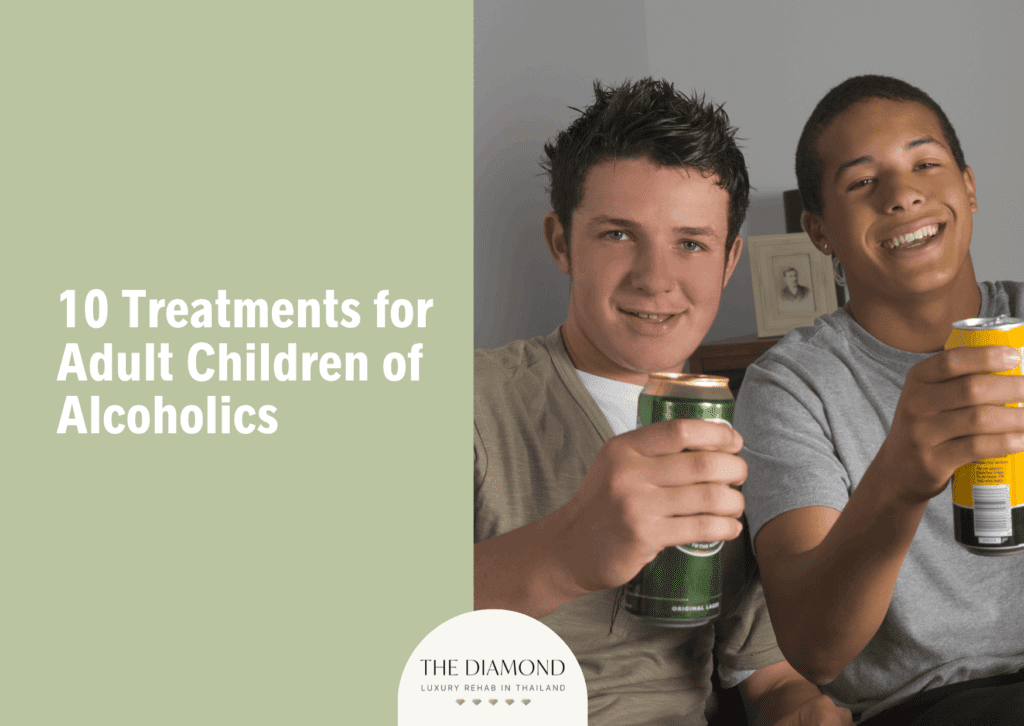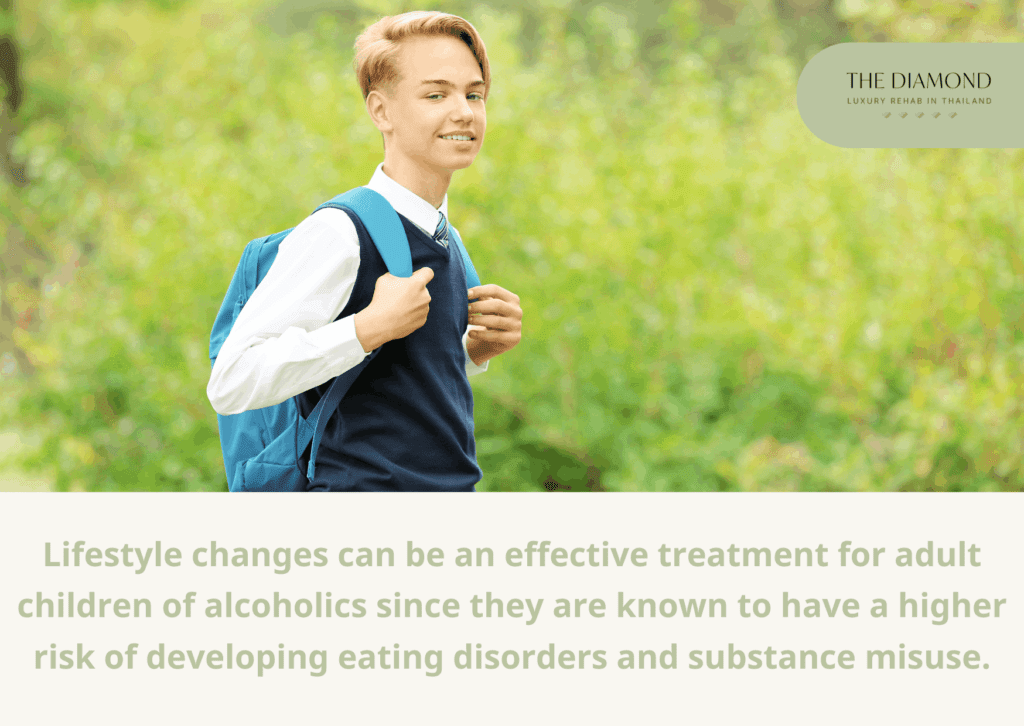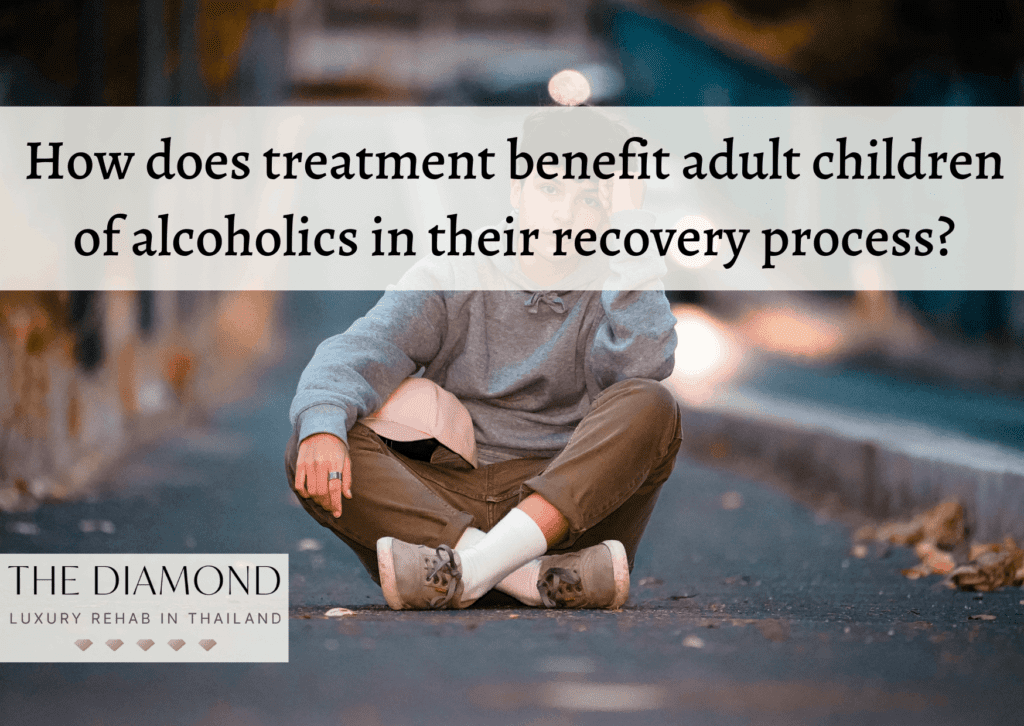10 treatments for adult children of alcoholics
Table of content
- 1. Therapy
- 2. Mindfulness therapy
- 3. Family therapy
- 4. Cognitive behavioral therapy (CBT)
- 5. Pharmacotherapy
- 6. Self-Help books
- 7. Support groups
- 8. Trauma-Focused therapy
- 9. Education
- 10. Lifestyle changes
- What are adult children of alcoholics?
- What is important to know about treatment for adult children of alcoholics?
- How common are adult children of alcoholics?
- What are the common problems faced by adult children of alcoholics?
- What is the common treatment used in adult children of alcoholics?
- How can counseling assist adult children of alcoholics?
- How does treatment benefit adult children of alcoholics in their recovery process?

Adult children of alcoholics (ACOA) are individuals who spent their developmental years in a household where at least one parent suffered from alcohol use disorder. Growing up in this kind of environment may create maladaptive behaviors that can persist into adulthood.
Effective treatments for adult children of alcoholics include therapy, mindfulness practice, family therapy, cognitive behavioral therapy (CBT), pharmacotherapy, self-help books, support groups, trauma-focused therapy, education, and lifestyle changes.
Some of the most common problems in children of alcoholics are extreme self-criticism, social isolation, difficulties with relationships, approval-seeking tendencies, people-pleasing behavior, difficulty standing up for oneself, and impulsive behavior.
The 10 treatments for adult children of alcoholics are listed below:
1. Therapy
Therapy is a form of treatment that involves talking with a trained mental health professional to relieve emotional distress and promote optimal mental health. Another goal of therapy is to improve feelings of satisfaction and overall quality of life of patients.
It is effective in helping adult children of alcoholics work past their traumatic experiences and gaining awareness of how those terrifying events have affected them as an adult.
In general, according to Statista’s data on the number of U.S. adults who received mental health treatment or counseling in the past year from 2002 to 2021, in the United States, 41.7 million adults underwent therapy or counseling for their mental health within the previous 12 months in 2021.
Prescription medication was also used, along with inpatient or outpatient care, psychotherapy, and other forms of treatment. Two typical conditions for seeking mental health care are anxiety and depression.
2. Mindfulness therapy
Mindfulness therapy is the practice of being aware of one’s feelings, bodily sensations, or emotions in the present moment without judging them. It is a technique used to help someone feel better and reduce their stress.
Mindfulness is particularly effective for adult children of alcoholics who often deal with a negative inner voice as a result of growing up with an addicted parent, as it can retrain the mind to stop believing every negative thought one thinks of.
According to a 2016 survey on the prevalence, patterns, and predictors of meditation use among US adults published in Scientific Reports, out of the 5.2% (11.8 million) of US adults who had ever meditated, 2.6% (5.8 million) had done mantra, 2.5% (5.7 million) had done mindfulness meditation, and 3.7% (8.3 million) had done spiritual meditation.
3. Family therapy
Family therapy refers to a form of psychotherapy that helps family members communicate better and work through issues that may affect their psychological, behavioral, and emotional health.
It is effective in helping a child of an alcoholic look back at the painful family experience. It teaches them how to break the pattern of manipulation, control, and rigid attitudes in order to move towards a healthier family system where there is growth, trust, and love.
According to the 2022 State of Youth Mental Health Report by LifeStance with OnePoll, 63% of parents have sought therapy for themselves, their kids, or the entire family.
4. Cognitive behavioral therapy (CBT)
Cognitive behavioral therapy (CBT) is defined as a type of psychotherapy that helps individuals identify and challenge self-defeating thought patterns and replace them with more realistic, positive ones.
CBT is an effective treatment for an adult child of an alcoholic, as it can help him or her unlearn the negative thought patterns they adopted as a child and replace them with healthier ones.
In a journal article entitled, “Cognitive Behavior Therapy With Children of Alcoholics” written by Wanda Webb for the 1993 issue of The School Counselor, it is suggested that using cognitive behavior therapy (CBT) in a school setting would allow school counselors to help children of alcoholics.
CBT counselors work with children to help them identify, analyze, and modify incorrect beliefs that affect their moods and behaviors. The counseling process involves reviewing the theoretical orientation, building a trusting relationship, identifying the problem behavior, deciding on a goal together, making a treatment plan and intervention strategies, and assessing those strategies.
According to a news article entitled, “Number of people accessing NHS talking therapy up by one fifth” published in Pulse, analysis by NHS Digital shows that in 2021/22, CBT was administered the most frequently, making up 46.3% of all therapy sessions that year. This percentage rose from 38.5% in 2020/21.
5. Pharmacotherapy
Pharmacotherapy refers to the use of doctor-prescribed medicine to help treat a disorder or disease. In treating addiction, medications are used in order to lessen the severity of withdrawal symptoms, tamp down alcohol and other drug cravings, and reduce the risk of using or relapsing.
Pharmacotherapy is effective for adult children of addicts who have followed a parent into active addiction. It may involve the use of medications approved by the Food and Drug Administration for alcohol use disorder (AUD), such as naltrexone, acamprosate, and disulfiram.
An article entitled, “Few are prescribed medications to treat alcohol problems” published in the National Institutes of Health states that only 1.6% of individuals with AUD reported using an approved AUD medication, and only 7.3% of those with AUD reported receiving any treatment for alcohol use in the previous year.
Only around 223,000 of the estimated 14.1 million adults with AUD took medication to treat their condition.
6. Self-Help books

Self-help books are written to guide a reader through a change of habits or in overcoming personal difficulties. They belong to the nonfiction genre and often include steps, approaches, or methods to achieve certain changes or improvements.
There are plenty of self-help books for adult children of alcoholic parents anyone can find online, and most of them come with positive reviews from readers. Self-help books can be effective in giving an individual a new perspective on their situation and in offering insights on how they can break the generational curses that have haunted their family history.
According to the Self-Help Books Statistics from WordsRated, annual sales of self-help books are estimated to be approximately 10 million. This figure is probably higher when used book sales, digital book sales, and books purchased outside the US are included.
7. Support groups
Support groups are groups of people who get together, either online or in person, to share their problems and experiences and offer each other help and advice. They give members a safe space where they can vent about what is troubling them without any judgment.
Support groups such as Al-Anon Family Groups and Adult Children of Alcoholics (ACA) have been effective in helping friends and families who have been impacted by their loved one’s alcoholism share their experiences and find solid social support.
According to the 2021 Membership Survey Results of the Al-Anon Family Groups, the 16,486 members that took part in their poll represent only a small section of their fellowship.
8. Trauma-Focused therapy
Trauma-focused therapy is an approach to therapy that has been shown to help children, adolescents, and families gain an understanding of how their traumatic experiences affected their overall well-being.
Trauma therapy is particularly effective in improving coping skills, challenging problematic beliefs, and processing trauma-related emotions and feelings among adult children of alcoholics.
The percentage of people who undergo trauma-focused therapy is not known. However, according to an article entitled, “How does trauma therapy work?” from Mission Harbor Behavioral Health, a traumatic event will occur in the lives of up to 70% of adults. From these negative occurrences, 20% of those adults will go on to experience a trauma-related reaction or mental health issue.
9. Education
Both imparting information to others and receiving it from someone else are acts of education. In the context of being an adult child of an alcoholic, being educated about alcoholism is an important part of the journey to recovery.
Alcohol education is successful in helping people who have been impacted by someone else’s alcoholism understand the truth about alcohol use disorder, its effects on one’s health and in the family unit, and in minimizing adult children of alcoholics’ risk of developing a substance use disorder in the future.
An article about the children of alcoholics foundation, written by Migs Woodside and published in 1997 in the journal Alcohol Health and Research World, found that medical directors and human resource specialists from major firms were ignorant of the possibility that family alcoholism could have long-term negative impacts on the workplace.
From this finding, the article suggested that education about alcoholism and its effects can be helpful even for those without addiction or mental health issues.
10. Lifestyle changes
Lifestyle changes are behavior adjustments or habit modifications that promote constructive life changes. Some examples include sleeping patterns, eating tendencies, and levels of physical activity.

Lifestyle changes can be an effective treatment for adult children of alcoholics since they are known to have a higher risk of developing eating disorders and substance misuse. Making lifestyle changes, such as increasing physical activity, gaining enough sleep, and eating a balanced diet can bring back healthy eating habits and boost one’s self-esteem once again.
The number of adult children of alcoholics who engage in lifestyle changes to aid their recovery is not known. However, according to a 2001 study on achieving a healthy lifestyle among United States adults published in the journal Ethnicity & Disease, four healthy lifestyle practices that are linked to lower morbidity and death from a variety of chronic illnesses, namely not smoking, adequate fruit and vegetable intake, adequate physical activity, and maintaining normal body weight, were practiced by only 6.8% of the US population.
What are adult children of alcoholics?
Adult children of alcoholics (ACOAs) are adults who, as children, grew up with parents or guardians who struggled with alcohol use disorder. Growing up in such an unpredictable environment can have devastating effects on a child, but its manifestations may only surface during adulthood.
Children of alcoholics often struggle with unmet emotional needs, resulting in poor self-esteem, an intense desire to please people, fear of abandonment, isolation, and fear of personal criticism.
What is important to know about treatment for adult children of alcoholics?
Treatment for adult children of alcoholics is not a one-size-fits-all approach. This means that the experiences and unique circumstances of each adult child of an alcoholic may be different from others.
Their treatment plan will therefore be largely based on their unique situations and emotional needs. It is also worth noting that sticking to a treatment plan is crucial in getting the maximum benefit from your treatment and essential in avoiding the risk of relapse.
How common are adult children of alcoholics?
Adult children of alcoholics are common, although the exact number is not known. However, according to the alcohol facts and statistics from the National Institute on Alcohol Abuse and Alcoholism (NIAAA), in 2019, there were 14.5 million people in the United States aged 12 and older who were living with alcohol use disorder.
A report from the Substance Abuse and Mental Health Services Administration (SAMHSA) entitled, “Children Living with Parents Who Have a Substance Use Disorder” estimates that one in ten kids (7.5 million) have experienced living with at least one parent who has an alcohol use disorder.
What are the common problems faced by adult children of alcoholics?
The common problems in adult children of alcoholics are that they may still experience the terror, anxiety, rage, and self-hatred they had as children. During adulthood, they may notice the resurfacing of their previous coping mechanisms and habits.
These can manifest as the most common ACOA characteristics, including extreme self-criticism, social isolation, difficulties with relationships, approval-seeking tendencies, people-pleasing behavior, difficulty standing up for oneself, and impulsive behavior.
Do adult children of alcoholics struggle with trust issues?
Yes, adult children of alcoholics struggle with trust issues. These deep-seated trust issues stem from the inability to trust their alcoholic parent to be present or even just to stop drinking.
This lack of trust established early in their life tends to persist into adulthood, making it difficult for an ACOA to build and maintain long-lasting relationships. Other relationship-related difficulties may also arise, including fear of commitment, controlling behavior, and dependency or codependency.
Can adult children of alcoholics have difficulty expressing their emotions?
Yes, adult children of alcoholics have difficulty expressing their emotions. The unpredictability of the response they would get back when expressing emotions from childhood is the main reason for this.
For a kid who could get screaming, sarcasm, or slamming the door as a response, it is much easier to ignore, push down their feelings, or just act out. Without the presence of a trusting adult, they cannot access, identify or vocalize their feelings.
What is the common treatment used in adult children of alcoholics?
The common treatment used in adult children of alcoholics is therapy. Therapy looks to identify and assist in changing potentially harmful or unhealthy behaviors toward drinking. It also gives ACOAs a secure and accepting environment to express their feelings.
Treatment frequently focuses on current issues and solutions and is led by a licensed mental health professional. Therapists who specialize in working with ACoAs can offer validation and understanding, helping people overcome their experiences.
How can counseling assist adult children of alcoholics?
Counseling allows adult children of alcoholics to revisit their childhood in a secure setting and helps them recognize what is motivating their actions.
In counseling, a child of an alcoholic can also pick up the abilities they will need to recover and prosper, such as emotional regulation, coping strategies, self-esteem, and conflict resolution.
How does treatment benefit adult children of alcoholics in their recovery process?

Different treatment options may benefit adult children of alcoholics in their recovery process by helping them overcome their traumatic past and transform their lives for the better.
ACOA treatments are also centered on healing from the effects of growing up with alcoholic parents, allowing ACOAs to understand how to achieve well-being so they can become devoted parents themselves.
Can treatment help adult children of alcoholics develop healthy coping strategies?
Yes, treatment can help adult children of alcoholics develop healthy coping strategies. For instance, counseling sessions with a therapist allow a patient to learn helpful coping skills or mechanisms to get through stress or other difficult situations, so they can make better decisions in the face of those challenges.
Some examples of healthy coping skills are relaxation techniques, such as meditation and deep breathing, exercising, engaging in a new hobby, gardening, outdoor activities, journaling, and volunteering.
Can treatment provide long-term support for adult children of alcoholics in their recovery journey?
Yes, treatment can provide long-term support for adult children of alcoholics in their recovery process. The possible parts of a treatment program, such as medications, counseling, lifestyle changes, or therapy can all help ACOAs learn more about their situation, resolve underlying issues, establish a robust support network, and find more effective ways to handle life stressors.
Each of these elements is essential to breaking the vicious cycle of emotional abuse and achieving lasting recovery.

